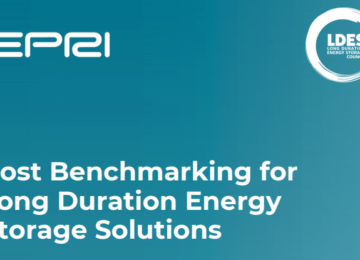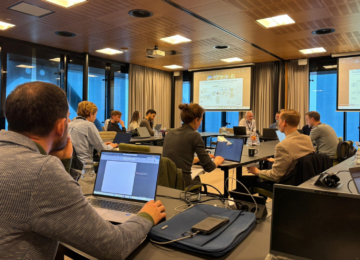Interview with Suzanne Kröger (GroenLinks - PvdA) - Energy storage as indispensable link in energy transition
The Lower House elections are just around the corner, and Energy Storage NL is curious to see how energy storage is included in the party programs of various political parties. In the run-up to the elections, Energy Storage NL is focusing on 'energy storage in politics'. For this campaign, we interviewed several members of parliament about what they think is the importance of energy storage in the energy system. This time the word: Suzanne Kröger, member of parliament on behalf of GroenLinks - PvdA.
What do you think is the main added value of energy storage in the energy system, in the short and long term? And how do you see the role of storage within the energy system itself?
In an energy system that runs on solar and wind, energy storage plays an essential role because these sources are not continuously available. Storage is necessary to bridge periods of low solar and wind. In the short term, storage helps manage supply and demand more flexibly, and is particularly relevant in addressing grid congestion. In the long term, storage remains crucial for bridging longer periods without renewable generation. Within the energy system, storage is the connecting link between generation, consumption and grid capacity.
What role do you see for energy storage in countering grid congestion, and do you think this potential is currently being adequately exploited?
Storage can definitely help alleviate grid congestion, but it is not a one-size-fits-all solution. In some cases, storage can actually amplify grid congestion. The match between storage and grid congestion requires careful management.
What's missing now is a structural approach that looks at where the electricity demand is, where generation is taking place, and where the two don't coincide - that's where you need storage. This system approach is not yet sufficiently applied. Policy is highly compartmentalized and fragmented across various ministries and domains. This impedes the use of the full potential of storage to reduce grid congestion.
What do you think is the main reason that the development and integration of storage is still lagging behind in the Netherlands?
In my opinion, the problem with storage is not isolated. The whole energy transition is faltering. And that is because there is too little direction. We do not really know where we want to go with our energy system, and what is specifically needed to achieve this. This control is lacking, and this is noticeable on all fronts: in generation, in use and in storage.
As far as storage is concerned, I see mainly a great lack of vision, especially in the field of local storage. There is no clear picture of what a decentralized energy system should look like and what role storage plays in it. As a result, it remains ad hoc and incoherent. Onshore wind and rooftop solar are now even frustrated in their development, while it is precisely these forms of local generation that should be encouraged. But if you do not put simultaneous use and storage alongside them, you are missing an essential component.
To me, storage forms one point of an essential triangle: generation, use and storage must be organized in conjunction. If you don't - for example by not linking local generation to simultaneous use and storage - then you miss a crucial part. The result is that we get stuck in separate initiatives that do not reinforce each other sufficiently. The biggest obstacle is therefore not technical, but lies in the lack of systems thinking. As long as we do not take an integrated approach to the energy system, the role of storage will remain underexposed and its development will not get off the ground sufficiently.
How do you assess the current storage strategy and what do you think should be improved?
If I am honest, I am quite disappointed with how storage is currently being looked at. The current strategy is mostly a list of what is already happening, but really lacks a vision. In the Kamerbrief on grid congestion, for example, you don't see a concrete dot on the horizon. It doesn't say, "In 2040 our energy system will look like this, with a role for storage in this way." And that is what we do need.
As far as I'm concerned, the solution lies in recognizing that we really need to move toward a decentralized energy system. That means bringing together generation, consumption and storage locally - in neighborhoods, in business parks. If that is the goal, then the role of storage naturally becomes part of it. From that direction you can then set standards and stimulate: for example, by saying that storage must be provided as standard for new generation locations, or by subsidizing neighborhood and company batteries.
Until we develop an integrated system vision, we will remain dependent on expensive grid reinforcements. While the smart use of storage can save costs and make the energy system more efficient. So yes, we really need more control, direction and direction.
What do you think it takes to go from "think is important" to true priority?
I think we really need to move away from the idea that storage is only "important," and see it much more as something that is indispensable. Storage is necessary to accelerate the energy transition and to solve the problem of grid congestion.
If you take that seriously, it means that you also have to anchor it in policy. This can be done, for example, by including concrete goals for a decentralized energy system in which storage is a natural component. This also includes forcing network operators to seriously consider flexibility options such as storage in their investment plans. We recently submitted a motion on this subject to put it firmly on the agenda.
In addition, I think it is important that we think about scaling up. I am concerned about the rapid rise of home batteries, whereas I would rather see us commit to neighborhood batteries or storage on business parks. That is much more socially efficient and fair, and also prevents inequality between people who can and cannot afford a home battery.
To make that possible, standardization and targeted subsidies can play a role. But the bottom line is that we need to treat storage as an integral part of the energy system, not as a stand-alone solution that you 'might' add on. Only then will it get the priority it deserves.
What can we expect from Green Left-PvdA on storage in the run-up to the election?
Storage receives explicit attention within GroenLinks-PvdA. In the run-up to the elections, we are committed to developing a decentralized energy system in which storage forms a logical and indispensable component. A separate section in the draft party program is devoted to this. In addition, we continue to exert pressure on multiple fronts: from encouraging community storage, such as neighborhood batteries, to promoting local energy hubs.





